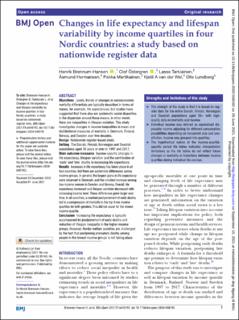Changes in life expectancy and lifespan variability by income quartiles in four Nordic countries: a study based on nationwide register data
Brønnum-Hansen, Henrik; Östergren, Olof; Tarkiainen, Lasse; Hermansen, Åsmund; Martikainen, Pekka; Wel, Kjetil A. van der; Lundberg, Olle
Peer reviewed, Journal article
Published version
Date
2021-06-29Metadata
Show full item recordCollections
Original version
http://dx.doi.org/10.1136/bmjopen-2020-048192Abstract
Objectives: Levels, trends or changes in socioeconomic mortality differentials are typically described in terms of means, for example, life expectancies, but studies have suggested that there also are systematic social disparities in the dispersion around those means, in other words there are inequalities in lifespan variation. This study investigates changes in income inequalities in mean and distributional measures of mortality in Denmark, Finland, Norway, and Sweden over two decades. Design: Nationwide register-based study. Setting: The Danish, Finnish, Norwegian and Swedish populations aged 30 years or over in 1997 and 2017. Main outcome measures Income-specific changes in life expectancy, lifespan variation and the contribution of ‘early’ and ‘late’ deaths to increasing life expectancy. Results: Increases in life expectancy has taken place in all four countries, but there are systematic differences across income groups. In general, the largest gains in life expectancy were observed in Denmark, and the smallest increase among low-income women in Sweden and Norway. Overall, life expectancy increased and lifespan variation decreased with increasing income level. These differences grew larger over time. In all countries, a marked postponement of early deaths led to a compression of mortality in the top three income quartiles for both genders. This did not occur for the lowest income quartile. Conclusion: Increasing life expectancy is typically accompanied by postponement of early deaths and reduction of lifespan inequality in the higher-income groups. However, Nordic welfare societies are challenged by the fact that postponing premature deaths among people in the lowest-income groups is not taking place.

